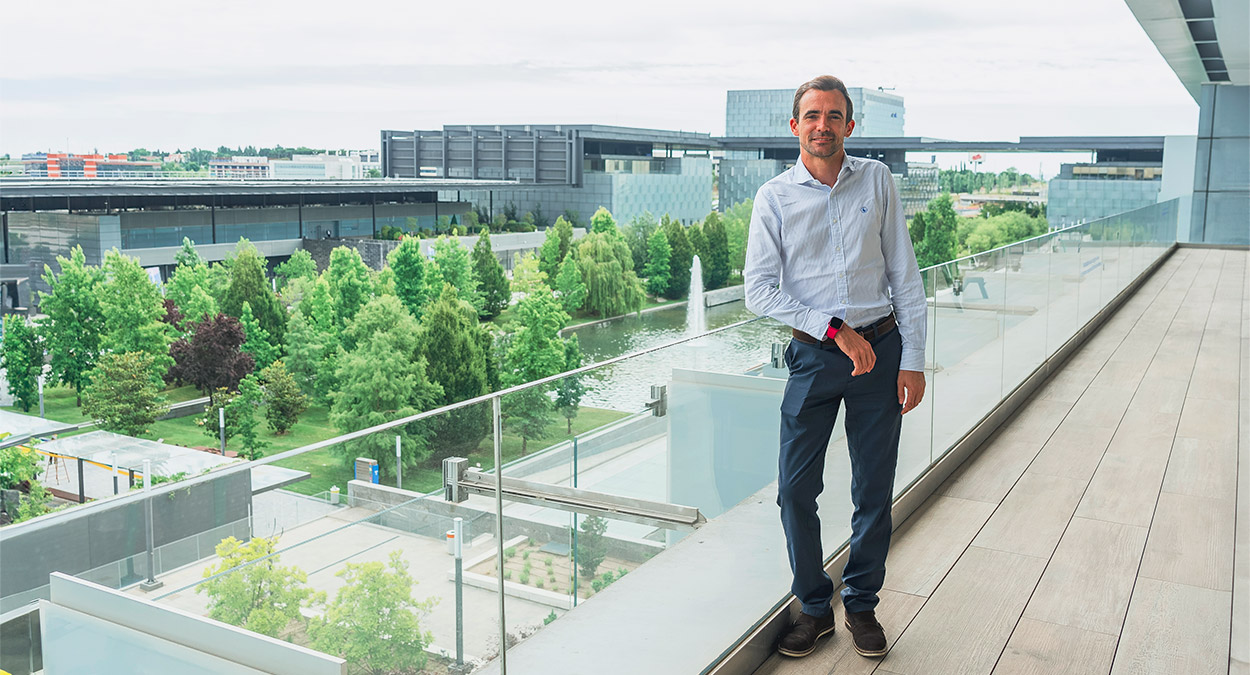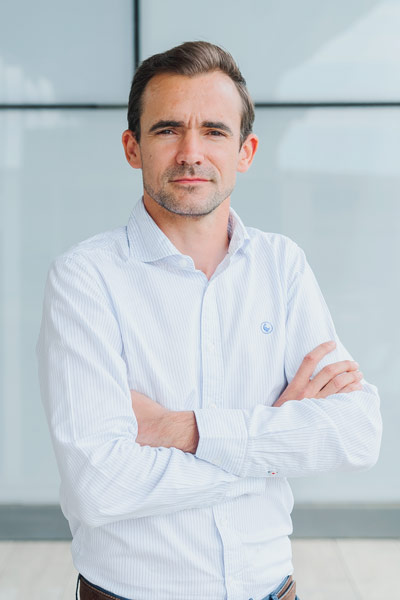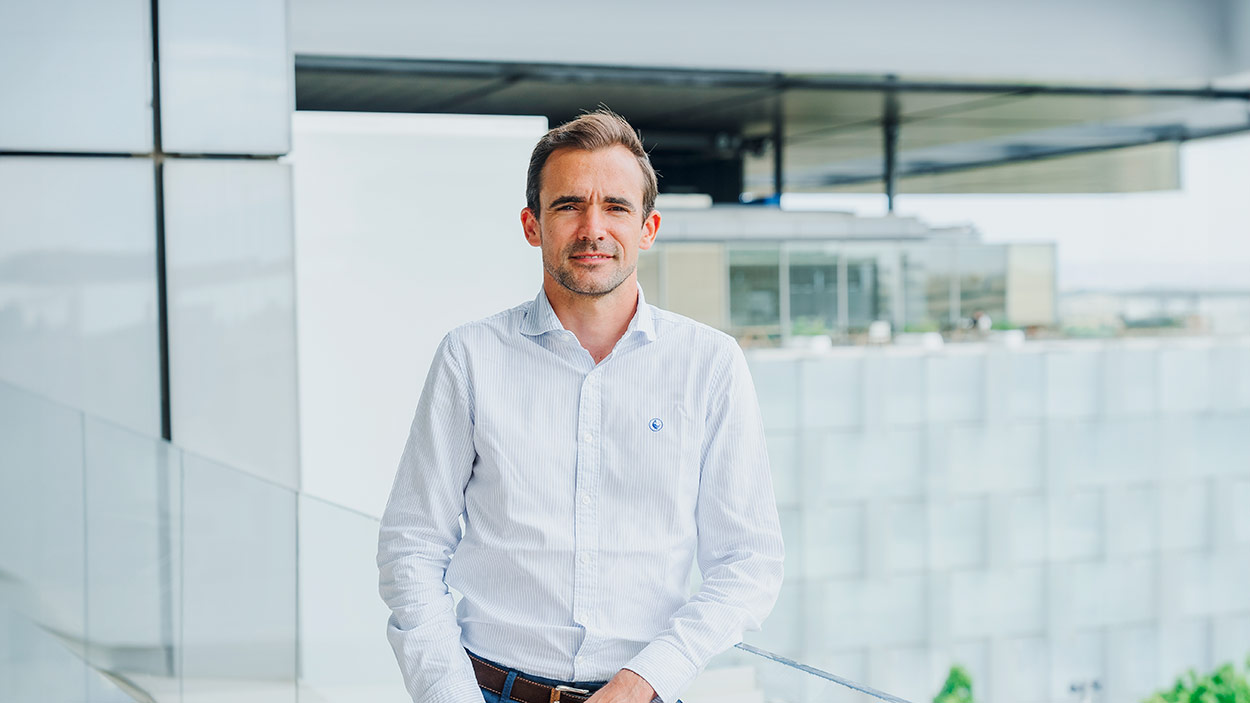“Each production company must digitalize itself according to its circumstances, objectives, and needs.” Darío Cesena, Geprom
What motivated the creation of Geprom and what is your purpose?
Geprom Connecting Industries was born in 2018 with the purpose of offering advanced technological solutions in the field of industrial automation, process digitalization and system integration. We wanted to meet the existing need in many sectors to integrate digital technologies into their production lines and operations, in order to become more efficient and sustainable.
Today, as Geprom part of Telefónica Tech since 2021, we are an engineering company with an innovative and dynamic spirit dedicated to the development and integration of high value-added technological solutions in the field of industry and infrastructure, leveraging on the technology-people binomial.
How do you adapt to the needs of each customer?
We understand that each company, regardless of its size and sector, implements its digitalization process in a particular and unique way, according to its own circumstances, objectives, and needs. Always integrating and adapting its business model to people, data, machines, and processes.
On this basis, we provide our customers with the right solutions, services and products to make their digital transformation a reality, guiding them along the entire path required by this revolution.
Innovation is one of our strategic pillars, and we strive to provide clients with solutions that are differentiated from the competition.
Following the acquisition by Telefónica Tech, what have been the most significant changes experienced by Geprom?
The integration in Telefónica Tech allows us to combine our experience and technological solutions with its infrastructure, capabilities, and value proposition. As a result, our global service offering is more complete and robust, enhancing our joint capacity to offer comprehensive digitalization and automation solutions, both nationally and internationally.
It has also allowed us to position ourselves as a unique integrated supplier to the industry, from consulting and solution design to implementation and ongoing support. This includes services such as automation and digitalization of processes, artificial intelligence, internet of things (IoT), cyber security and cloud, among others.
In addition, the integration with Telefónica Tech allows us to greatly strengthen our commercial reach, thus achieving a capacity and positioning unimaginable for Geprom and expanding our presence to new markets. In the current competitive environment in which we find ourselves, this is a great differentiator to boost factories' digitalization.
 Darío at the Telefónica Tech offices in Distrito Telefónica, Madrid..
Darío at the Telefónica Tech offices in Distrito Telefónica, Madrid..
What challenges and opportunities have Geprom experienced as part of Telefónica Tech?
There were both challenges and opportunities. Among the challenges, we have had to adapt to the standards and processes of a listed multinational, which has required a considerable alignment and training effort at the operational and commercial levels.
The other major challenge for Geprom has been to be able to meet the demand generated by Telefónica's enormous sales force, while complying with the common goal of always supporting and satisfying the customer.
The opportunities, at the same time, have been immense. Especially at the commercial level. The growth that Geprom has experienced has been possible because we have been able to assume this capillarity and commercial strength. This has allowed us to diversify both sectorially and territorially, which is key to the scalability of the business.
This integration also allows us to be at the forefront of technology and to offer our customers superior added value thanks to Telefónica Tech's broad and specialized value proposition. All this, together with the global capabilities of Telefónica Group, allows us to be a differential technological integrator for our customers.
As part of our global value proposition, we provide advanced capabilities in AI, Data, and industrial Cyber Security.
Could you tell us about a specific case in which the partnership between Geprom and Telefónica Tech has generated added value for customers?
One of the most outstanding cases is the global digitalization of Stolt's operations, dedicated to terrestrial aquaculture. The joint value proposition between automation and digitalization of processes has been key to ensure the success of the project and achieve the customer's objectives. As well as the integration capabilities of advanced analytics and Artificial Intelligence that allow us to anticipate the demand and supply of the product five years ahead.
I would also highlight the enormous value that this binomial brings to the implementation of a comprehensive cyber security and industrial automation solution.
We can say, without going into specific customer details, that we combine our automation solutions with Telefónica Tech's advanced capabilities in managed connectivity and cyber security. This has allowed our customers not only to optimize their production processes, but also to connect and protect their critical infrastructures against cyber threats, thus ensuring continuous and secure operation.
How do you see the current situation of the industry globally and what do you consider to be the biggest challenges and trends?
 The industry is globally in a phase of accelerated digital transformation, driven by the need for efficiency, flexibility, and sustainability. Major challenges include the management of massive data, cyber security and the integration of emerging technologies in a very short timeframe.
The industry is globally in a phase of accelerated digital transformation, driven by the need for efficiency, flexibility, and sustainability. Major challenges include the management of massive data, cyber security and the integration of emerging technologies in a very short timeframe.
Emerging trends range from advanced automation and robotics to artificial intelligence and industrial IoT, not to mention OT security. Geprom is positioning itself to meet these challenges and take advantage of new trends by investing in R&D, continuously training our team and adopting Telefónica Tech's capabilities.
In the industry context, how important are data and AI? Can you share any recent innovations that have been made possible by data analytics?
In today's industry, data and artificial intelligence are fundamental. So much that data has become one of the most important assets of companies. They no longer produce only their products, but all of them also produce the data that emerges from their production processes. How they treat and manage this data will enable companies to differentiate themselves from their competitors.
An example of all this is the integration of Artificial Intelligence in production processes, something that allows more informed decisions, predicting failures or breakdowns and even self-managing and optimizing processes in real time, in an autonomous manner.
Our ambitious growth plan is based on national and international expansion, leveraging Telefónica Group's commercial strength and presence in various countries.
What are your expectations for the future of the industry and what are your plans for further growth?
We anticipate that industry will continue to move towards greater digitalization and connectivity at a frantic pace. Demand for automation, digitalization, data analytics, and cyber security solutions will continue to rise in the industrial sector.
Our growth plans include continuing our national expansion to strengthen our capabilities for Spanish industry, and international expansion to address markets where the Group has a presence. We are also working on developing new capabilities based on Artificial Intelligence and consolidating our capabilities in OT connectivity and industrial cyber security to reinforce our global value proposition.
We will remain committed to innovation in order to offer solutions that help our customers to be more competitive and resilient in a constantly evolving industrial environment.
 Hybrid Cloud
Hybrid Cloud Cyber Security & NaaS
Cyber Security & NaaS AI & Data
AI & Data IoT & Connectivity
IoT & Connectivity Business Applications
Business Applications Intelligent Workplace
Intelligent Workplace Consulting & Professional Services
Consulting & Professional Services Small Medium Enterprise
Small Medium Enterprise Health and Social Care
Health and Social Care Industry
Industry Retail
Retail Tourism and Leisure
Tourism and Leisure Transport & Logistics
Transport & Logistics Energy & Utilities
Energy & Utilities Banking and Finance
Banking and Finance Smart Cities
Smart Cities Public Sector
Public Sector




